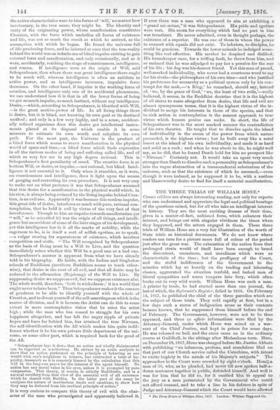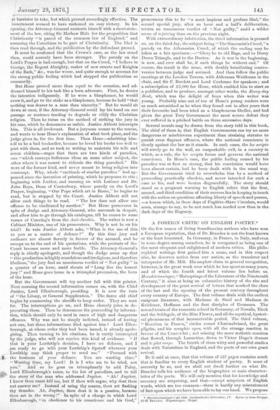THE THREE TRIALS OF WILLIAM HONE.*
Causes cilebres are always interesting reading, not only for experts- who can Understand and appreciate the legal and political bearings- of the questions raised, but for all who take an intelligent interest in history. They are the most exciting dramas of. their time, given in a matter-of-fact, unbiased form, which enhances their interest, and brings out with singular vividness the times when they happened, and the actors engaged in them. These three trials of William Hone are a very fair illustration of the worth of State trials as historical docuinents. We do not know where- readers can turn for a picture more full of colour of the period just after the great war. The exhaustion of the nation from that prolonged strain would of itself have been enough to breed the discontent, uneasiness, and unruliness which were se characteristic of the time ; but the profligacy of the Court, and the stolid indifference of the Government to the- miseries which lay so heavily on the trading and labouring- classes, aggravated the situation tenfold, and lashed men of liberal sympathies and warm tempers into fury, which often, broke out in very wild words. William Hone was such a man. A printer by trade, he had started more than one journal, the last of which, the Reformist's Register, failed in 1816. On February 14, 1817, he published the chief of the three parodies which are the subject of these trials. They sold rapidly at first, but in a. few days such a storm of indignation arose as their contents' became known, that he suppressed them himself before the end' of February. The Government, however, were not to be thus. appeased, and three ex officio informations were filed by the Attorney-General, under which Hone was seized on a war- rant of the Chief Justice, and kept in prison for some days. He was released oh bail, and the cases came on in the ordinary- course at Guildhall, in the sittings after Michaelmas term. Here, on December 18,1817, Hone was charged before Mr. Justice Abbott with publishing "an infamous, profane, and scandalous libel on that part of our Church service called the Catechism, with intent- to excite impiety in the minds of his Majesty's subjects." The- approaches to the Court were crowded by eight o'clock. Honqa man of 36, who, as he pleaded, had never till now spoken half-a- dozen sentences together in public, defended himself. And well it was for him that he did so, for it enabled him to appeal to- the jury as a man persecuted by the Government who could not afford counsel, and to take a line in his defence in spite of Judge and Attorney-General which the Court would have allowed
* 27,e Three Trials of William Hose, 1817. London : William Tegg and Co.
in barrister to take, but which proved exceedingly effective. The ';'overnment seemed to have reckoned on easy victory. In his opening, the Attorney-General contents himself with a short state- ment of the law, citing Sir Mathew Hale for the proposition that Christianity "is parcel of the common law of England," and assuming the Catechism to be part of Christianity. The libel is then read through, and the publication by the defendant proved. It must be confessed that the Crown's case, as the law stood then, could scarcely have been stronger. The parody on the Lord's Prayer is bad enough, but that on the Creed, "I believe in George, the Regent Almighty, maker of new streets and Knights of the Bath," &c., was far worse, and quite enough to account for the strong public feeling which had stopped the publication so summarily.
But Hone proved more than equal to the occasion, and ad- dressed himself to his task like a born advocate. First, he denies the intention indignantly. If he were a blasphemer, he would avow it, and go to the stake as a blasphemer, because he held "that nothing was dearer to a man than sincerity." But he would sit down at once, if the Attorney-General could lay his hand on one passage or sentence tending to degrade or vilify the Christian religion. Then he turns on the method of striking the jury in his case, which he denounces as unfair. Justice Abbott interrupts him. This is all irrelevant. But a juryman comes to the rescue, and wants to hear Hone's explanation of what took place, and the judge gives in, for the first time. Then Hone—admitting him- self to be a bad bookseller, because he loved his books too well to part with them, and so took to writing to maintain his wife and seven children—urges that there are two kinds of parodies, one "which conveys ludicrous ideas on some other subject, the other where it was meant to ridicule the thing parodied." His were of the former kind, and never meant to bring religion into contempt. Why, whole "cartloads of similar parodies" had ap- peared since the invention of printing, which he proposes to cite ; beginning with Luther, and running on with Latimer and Dr. John Boys, Dean of Canterbury, whose parody on the Lord's Prayer, beginning, Our Pope which art in Rome," he begins; to read, but is stopped by the Court. Justice Abbott will not allow such things to be read. "The law does not allow one offence to be. vindicated by another." But Hone perseveres in spite of Judge and Attorney-General, who succumb in despair, and allow him to go through his catalogue, till he comes to some verses of Canning's from the Anti-Jacobin. The writer is now a Cabinet Minister, one of his prosecutors. Why is not he on his trial? In vain Justice Abbott asks, "What is the use of this to you as a matter of defence ?" By this time jury and audience are almost fiercely in favour of the accused, and he sweeps on to the end of his quotations, while the protests of the Court become more and more feeble. The Attorney-General's reply is chiefly apologetic, and though the Judge sums up that "this production is highly scandalous and irreligious, and therefore libellous," the jury find an unanimous verdict of "Not guilty" in a quarter of an hour, amid shouts of "Long live the honest jury !" and Hone goes home in a triumphal procession, the hero of the hour.
But the Government will try another fall with this printer. Next morning the second information comes on, with the Chief Justice, Lord Ellenborough, presiding. It is now the turn of "the Litany, or General Supplication." The fierce old chief begins by summoning the sheriffs to keep order. They are sent for. The interruptions go on, and Hone cleverly joins in de- precating them. Then he denounces the proceeding by informa- tion, which should only be used in cases of high and dangerous offences. Why was not he simply indicted, instead of having not one, but three informations filed against him ? Lord Ellen- borough, at whose order they had been issued, is already apolo- gising. Then turning to his citations, he is curtly interrupted by the judge, who will not receive this kind of evidence. "If that is your Lordship's decision, I have no defence, and I .am ready to go with your Lordship's tipstaff wherever your Lordship may think proper to send me." "Proceed with the business of your defence. You are wasting time." "Wasting time, my Lord ! It is I who am to be tried, not you." And so he goes on triumphantly to add Paley, opb Lord Ellenborough's tutor, to his list of parodists, and to tell the story of the man who addressed Jupiter. " Ah ! Jupiter, 1 know thou canst kill me, but if thou wilt argue, why dost thou not answer me? Instead of using thy reason, thou art flashing thy thunder. Al', Jupiter, thou dost it in a passion, because thou art in the wrong !" In spite of a charge in which Lord Ellenborough, "in obedience to his conscience and his God,"
pronounces this to be "a most impious and profane libel," the second special jury, after an hour and a half's deliberation, return an unanimous verdict of "Not guilty," amid a wilder scene of rejoicing than on the previous night.
With extraordinary infatuation, the third information is pressed on, on the third day, the subject being "The Sinecurist's Creed," a parody on the Athanasian Creed, of which the ending may be taken as a fair specimen :—" Glory be to old Bags, and to Derry Down Triangle, and to the Doctor. As it was in the beginning, is now, and ever shall be, if such things be without end." Of course, the result is the same, with doubly humiliating contro- versies between judge and accused. And then follow the public meetings at the London Tavern, with Alderman Waithman in the chair, and Sir F. Burdett and Lord Cochrane for speakers ; and a subscription of 23,000 for Hone, which enabled him to start as a publisher, and to produce, amongst other works, the Every-day Book, which was the delight of boys when this writer was young. Probably nine out of ten of Hone's young readers were as much astonished as he when they found out in after years that their favourite had been tried as a blasphemous libeller, and had given the great Tory Government the most severe defeat they ever suffered in a pitched battle on three successive days.
Several morals may be drawn from the story told in this book. The chief of them is, that English Governments can try no more dangerous or mischievous experiment than straining statutes to punish even flagrant offences, where the national conscience is clearly against the law as it stands. In such cases, the lax scripta will surely go to the wall, an unspeakable evil, in a country in which, as a rule, the lax seripta forms and governs the national conscience. In Hone's case, the public feeling roused by his parodies was at first so strong, that his conviction would have been almost certain, had he been dealt with in the usual way. But the Government tried to overwhelm him by a method of proceeding practically obsolete, and never intended for such a case as his, and were beaten disgracefully. The story should stand as a pregnant warning to English rulers that the first, second, and third condition of their success lies in keeping in touch with the nation on questions affecting liberty of speech and person, —a lesson which, in these days of Fugitive-Slave Circulars, would seem, strange to say, to be not much less needed now than in the dark days of the Regency.







































 Previous page
Previous page